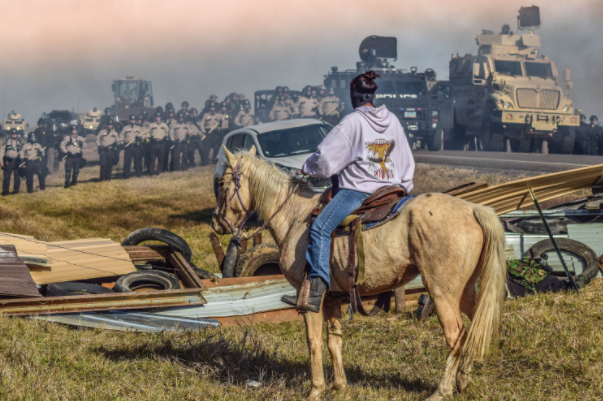Article by PBI-Canada

Photo by Ryan Vizzions.
The Dakota Access Pipeline (DAPL) carries 557,000 barrels per day of fracked oil from North Dakota through South Dakota and Iowa to Illinois. There it connects with the Energy Transfer Crude Oil Pipeline (ETCOP) that carries the oil to Texas.
The Indigenous Environmental Network has further noted that the Bayou Bridge Pipeline would be the final link from DAPL and ETCOP to refineries and ports in Louisiana.
In April 2016, Indigenous land defenders established the Sacred Stone Camp at the Standing Rock Indian Reservation (which is situated in North and South Dakota) as a focal point of opposition and resistance to the construction of the Dakota Access Pipeline that threatened cultural sites and their drinking water.
McAdam says: “It was tense and frightening. Even during the day, there was the airplane and the helicopter that was circling and circling. You couldn’t even rest. I was shocked. I came away from there shocked and astounded at how much military were there. I don’t think people realize how much military activity was directed against that camp.”
After months of resistance, and the criminalization and arrest of many Indigenous land defenders, that camp was cleared by police in February 2017.
Around that time, the then-United Nations Special Rapporteur on the rights of Indigenous peoples Victoria Tauli-Corpuz wrote: “While the actions taking place have been almost completely non-violent and peaceful, there has been a militarized, at times violent, escalation of force by local law enforcement and private security forces.”
After then-US President Donald Trump approved a permit allowing construction of the pipeline to be completed under Lake Oahe, the pipeline began operation in June 2017.
In July 2020, U.S. District Judge James Boasberg order the pipeline to be shut down and drained pending a review of its impact on land and water.
But Dakota Access has appealed the ruling and, as of November 2020, a court decision on the shutdown order was expected within the next couple months.
If the review is approved, the pipeline could be shut down for about 13 months.
With the election of US President Joe Biden, the Indigenous Environmental Network and others are calling on the president to put an end to DAPL.
